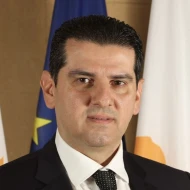Eleven months after the Mediterranean isle's near economic collapse, the Cypriot capital's pre-eminent avenue embodies the destruction wrought by a financial hurricane that, for a few dramatic weeks, put the EU's most easterly member state on the frontline of Europe's debt crisis. For President Nicos Anastasiades, who assumed power a year ago this week only to face an economic storm almost immediately, mention of that time is met with a pained expression. "The shock lasted several days," he told the Guardian, recalling the all-night talks in Brussels that precipitated the island's chaotic salvage last March. "The negotiations had started at 2pm on the Friday and lasted for hours … at 5am on Saturday they said 'either you accept it [the bailout deal] or on Tuesday the banks in Cyprus will close' … bankruptcy would have been a given," he said.
Unlike other eurozone rescues, the condition attached to Cyprus's economic lifeline was an immediate and unprecedented raid on bank savings. In return for €10bn (£8.25bn) in emergency aid from the EU, the European Central Bank and the International Monetary Fund, Anastasiades's newly elected government was forced to not only shut down the country's second-biggest lender but "bail in" the banks that, through overexposure to debt-stricken Greece, had caused the meltdown. Capital controls were imposed overnight as depositors with more than €100,000 savings were hit by massive losses. Global financiers looked on aghast as the island – until then the favoured offshore tax haven of Russian oligarchs and oil magnates – was turned into a testing ground by EU leaders unwilling to ask their reluctant taxpayers to save its banks from collapse.
"It wasn't easy to renege on what I had promised," said Anastasiades, admitting that it felt as if he had a gun to his head as he weighed the dilemma of accepting such draconian measures or the prospect of bankruptcy and state collapse. Speaking in Nicosia's sandstone colonial-era presidential palace, he said: "The idea had come to mature as much within the IMF as European mechanisms that … banking crises had to be solved with their own means, and the first who were judged to be a suitable guinea pig – because we are a small economy and small country and not [a] systemic [risk] for the rest of Europe – was Cyprus."
But as the 67-year-old leader marks his first year in office, he does so in the knowledge that while hit by recession and worse deflation than Greece – with prices falling by 1.6% over the past year – the war-partitioned island is faring better than many expected. With increasing momentum the plaudits have rolled in. Recently, Olli Rehn, the European commissioner for economic and monetary affairs, went out of his way to applaud the progress made, describing the republic's economy as "more resilient than expected". The praise followed similar statements by Jeroen Dijsselbloem, the Dutch finance minister and Eurogroup chairman widely seen as the architect of the controversial plan to slap savers with losses for the first time since the eruption of the debt crisis in Athens in late 2009.
Echoing these sentiments earlier this month, visiting international auditors said the island's budget execution had been such that "fiscaltargets for 2013 have been met with considerable margin". Even Cyprus's much-feared slump had been less bad than anticipated. "Output in 2013 is estimated to have contracted by about 6% in real terms which, while significant, is almost two percentage points better than forecast." Defying fears that the island would go the way of problem-plagued Greece, they added that the financial sector was also "showing signs of stabilisation". Relaxation of capital controls – though far from complete – is also under way.
Although the crisis is far from over and unemployment has soared from 12.7% in September 2012 to more than 17% – the steepest increase in the EU, according to Eurostat – Anastasiades readily acknowledges that the Cypriots' sanguine approach to life has helped. "Cypriots are confronting these problems and difficulties in a very different way to other Mediterranean countries," he said, adding that as a legacy of its days as a former crown colony Cyprus was "more like Ireland" than it was like Spain, Greece or Portugal. "We have a different mentality and culture; a stability and calm within the labour force. There are no demonstrations or strikes," he said. "I could say this is the British effect."
The privatisation programme forced on the island has provoked isolated protests, with angry electricity authority workers pelting parliament with fruit and rocks during a strike on Monday as lawmakers prepared to discuss a bill on selling the electricity, telecoms and ports authorities. But the apparent absence of any sustained ire or protest on the scale of the persistent demonstrations that have swirled around crisis-hit Greece has also surprised EU mandarins in Brussels. Anastasiades said that "like a good customer of a bank" islanders were keen to put the worst behind them, pointing out that unlike other bailed-out nations Greek Cypriots had had the experience of rebuilding their country after 1974. "We are paying for our lack of clear-sightedness, lack of decisiveness and miscalculation about how much the crisis would affect us," he insisted, adding that heading into crisis with an over-extended banking sector, exposure to debt-stricken Greece and bloated public sector, reforms were long overdue.
If his Communist predecessor, Demetris Christofias, had acted at the height of the euro crisis, when the EU was pressing most, Cyprus might have been spared, he said. "I don't think that the harshness of the measures adopted by our partners are more to blame than our own negligence, not taking the right measures at the right time." From the outset the Greek Cypriot leader, a moderate progressive, has argued that reunification of the island would not only heal the wounds that have festered on each side of its ethnic divide but be a boon to an economy experiencing its worst crisis since 1974.
More than ever, he argued, the discovery of oil and natural gas deposits in the waters off Cyprus make a settlement pressing. Oil companies, likewise, have signalled that they want a solution as soon as possible if they are to make the huge investment that would accompany exploration. With the relaunch of talks between Greek and Turkish communities this month – backed heavily by Washington – diplomatic traffic across the UN-patrolled 'green line' that bisects the capital will grow in the weeks ahead. "The strength of a united country is different," said Anastasiades who, going against the grain of popular opinion, has boldly espoused reunification for the past decade. "Greater co-operation with Turkish Cypriots will contribute to faster growth … a solution will help us confront the economic crisis better."
Source: The Guardian













